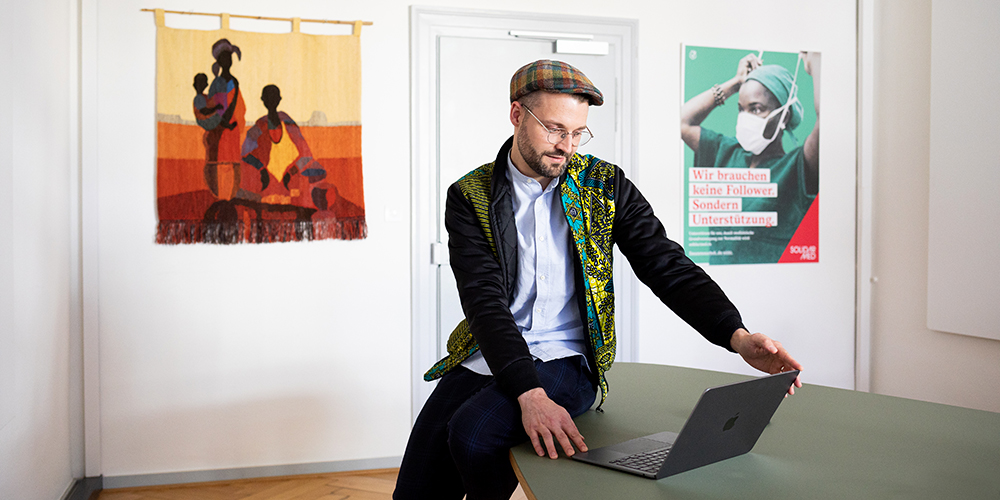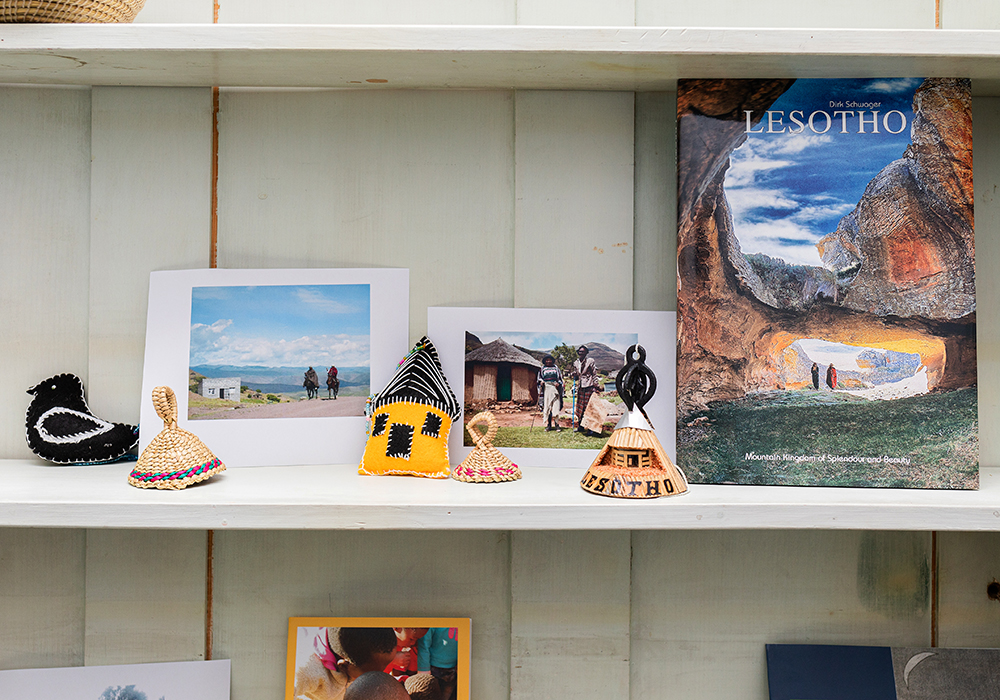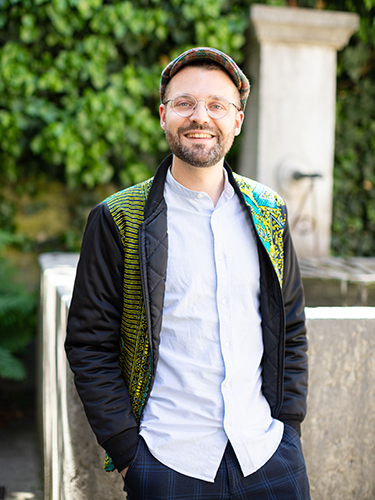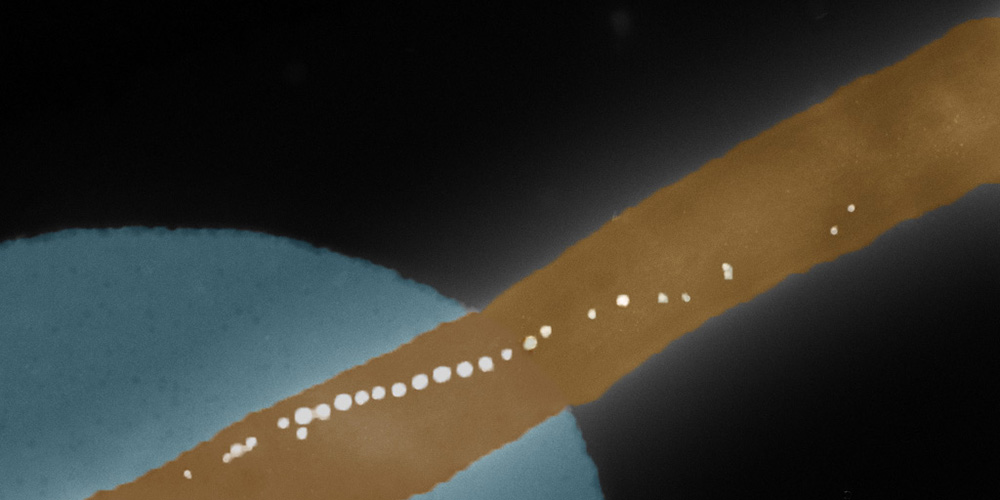In Focus: Alain Amstutz is a man of many interests
He conducts preventative health research in Lesotho, improves clinical research in Switzerland, and still manages to find time for his passion: music. As structured and focused as the epidemiologist and clinical researcher’s work is now, his career began almost by accident.
20 July 2023 | Catherine Weyer
“The funding for the Hair Salon Project was just approved – it’s happening!” Physician Alain Amstutz sounds euphoric – despite the fact that hair salons and HIV prevention don’t have much in common on first glance. However, that changes when you look more closely.
Amstutz is a postdoc in the Division of Clinical Epidemiology, where he splits his time between two research areas: first, improving healthcare in Lesotho, and second, conducting clinical studies in Switzerland and Europe and optimizing their methodologies.
His most recent project fits in with these interests: he and his wife want to use hair salons as outreach locations in Lesotho. “These are places where young women spend a long time having their hair braided. While they are there, they talk about many topics that would otherwise be mired in secrecy, such as domestic violence and sexuality.”
The path from Switzerland to Africa
Amstutz’s path from his hometown of St. Gallen to Lesotho was due more to coincidence than to planning: “I already had the urge to get out of Switzerland during medical school,” he explains. He completed his first internship in Cape Town, where he was confronted with HIV for the first time. “I was very struck by the fact that such a small virus can have such an enormous social impact.”
Shortly after that, he met research group leader Niklaus Labhardt at the Swiss Tropical and Public Health Institute. Labhardt was looking for pragmatic solutions to improve HIV treatment in Lesotho and examining their effectiveness in clinical studies. Thanks to relevant research experience in medical school, Amstutz had the requisite background for the job. “He got me involved. Ultimately, I spent four years in Lesotho and met my wife there as well.”
From HIV to high blood pressure, Covid-19 and innovative studies
The couple now lives in Switzerland, but regularly travels to the southern African country. Over the years, Amstutz has expanded his research focus in Lesotho: besides HIV, he now also works on high blood pressure and diabetes. “We now know how to improve HIV treatments and make them more accessible. We want to apply this knowledge to other illnesses as well,” he explains.
Besides the projects in Lesotho, Amstutz also conducts research in Europe. He is particularly interested in innovative approaches to study design and data analysis. “There is a lot of research waste because studies are planned badly and inefficiently, and too often end up being discontinued. As part of Professor Matthias Briel’s team, I am researching methods for improving the efficiency and innovativeness of randomized clinical trials, summarizing data from these studies, and connecting it with data from observational surveillance studies.”
In order to implement these designs in practice, Amstutz is planning a symposium with partners from London in September, and is working together with the Swiss HIV Cohort, the large-scale surveillance study for people living with HIV in Switzerland. He is also part of the EU-RESPONSE Consortium, which conducts innovative studies in the field of infectious diseases throughout Europe. Amstutz recently conducted and published a large data analysis summarizing the evidence on a Covid-19 medication from all studies worldwide for the Consortium.
An unanticipated career
As varied as these areas of work seem at first, for Amstutz, they are the perfect combination: “On the one hand, there is the field research, which is very focused on practical applications, and on the other, there is the highly structured methodology research and data analysis. I suppose that also reflects my personality,” he says, laughing.
Originally, he had planned to take an entirely different path: “I wanted to study at the Jazz School and become a musician,” he explains. He is still passionate about playing piano, but he signed up to study medicine instead of music and ended up in Basel. This career didn’t exactly follow a straight line, either. “I realized that the traditional hospital career is not yet for me. I enjoy an academic freedom and creativity that I wouldn’t have in the clinic,” says Amstutz.
As his next step, he is hoping for a scholarly change of scene outside of Switzerland. “I want to experience how research groups work abroad – in the UK, for example.” A project in Norway is also under discussion. In any case, he’s unlikely to be bored anytime soon. And this time, he has even planned a little in advance: “I have a plan for the next two to four years.” And after that? “As long as I can find the funding for my projects and my career, I will keep going.”
In Focus: the University of Basel summer series
The In Focus series showcases young researchers who are playing an important role in furthering the university’s international reputation. Over the coming weeks, we will profile academics from different fields – a small representative sample of the 3,000+ doctoral students and postdocs at the University of Basel.




